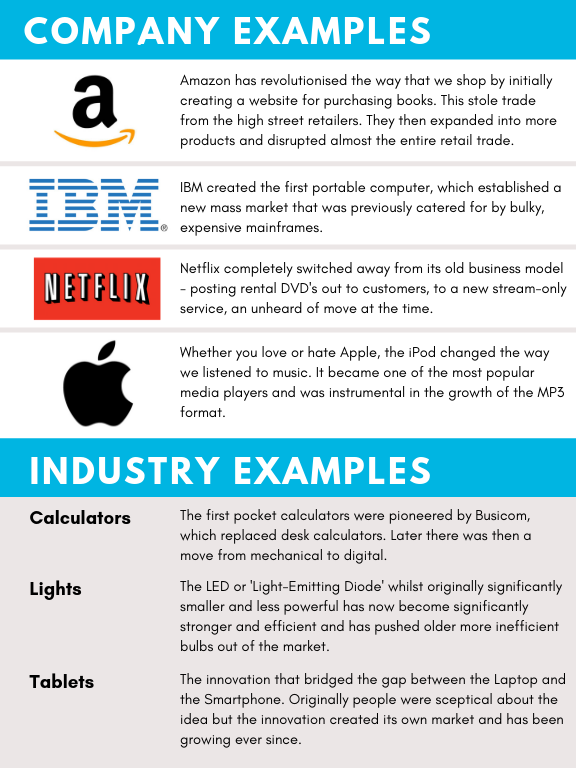
"One of the most consistent patterns in business is the failure of leading companies to stay at the top of their industries when technologies or markets change." Harvard Business Review
What do Blockbuster, HMV, Yahoo and Sony have in common? They're all relics of their former selves because they were outperformed in their own markets. ‘Disruptive Innovation’ is a key concept attributed to the rapid rise and fall of many well-established organisations.
There are many different industries that have been disrupted successfully by new, innovative ideas, many of which revolve around the internet and online business models. If you’re generating ideas, or in the early days of starting out, once you understand disruptive innovation, you can begin to plan your next game changing concept or development!
Businesses synonymous with disruptive innovation come at problems with quite different solutions. Typically they do this by harnessing new technologies and methods, developing new business models, and exploiting old technology in new ways. They will target either new, or overlooked, market segments to gain a significant competitive foothold.
Often, disruptive innovation is something different that shakes up the market. The concept has proved a powerful way of thinking about innovation-led expansion and exists to create growth through change.
So why is it that some established and successful businesses invest aggressively in the technology necessary to retain current customers, but still fail to make the technological advancements that customers demand in the future?
It’s because their innovation occurs along a very linear trajectory or ‘Sustaining Innovation’ - a process where slight improvement’s on the previous product are made and they then charge premium prices for the most demanding business relationships. This means they're very susceptible to being disrupted.

A bussiness idea that is disruptively innovative typically commences with one of two markets that larger businesses overlook.
Larger firms have a tendency to use sustaining innovation; they may end up paying less attention to their less demanding/less affluent customers which opens the door for a disrupter to attract a mass of people.
Start-up disrupters create a market where non previously existed! Basically they create customers by turning non-consumers into consumers.
By definition, disruptive innovation starts from one of the above but it doesn’t have to be the case. There are always plenty of ways to disrupt the market!
Knowing your market is very important. You need to know who your customers are, where you can improve their experience and why other products aren’t fulfilling their needs. Innovation should only come after careful market research because if you don’t know what your customers want then innovation becomes random, not disruptive.
The product
Your product or service is key! New products and services created through ‘disruptive innovation’ are generally fresh concepts, unproven, unpolished and usually offer something different to customers. It's important that you tick all the boxes and more so that you outperform the competition in your target market.
The choice
The ‘Innovators Dilemma’ is then met which is the difficult choice a company is faced with, between either holding on to an existing market or, capturing new markets by embracing new technologies and adopting new business models.
Large corporates can be slow to react to change. They may be incumbent, set in their ways and slow to recognize threats. There have been cases where they were aware of the threats but viewed the initial low demand as unattractive and not worth their time. This can result in your ideas existing completely unchallenged for a period of time. Make maximum use of it!
The future
With rapid improvements and access to technology it is becoming easier to transform simple game changing ideas into successful functioning companies.
The theory is in danger of becoming a victim of its own success. Make sure that if you want to disrupt your market you carefully adopt the principles of disruptive innovation. There is the danger that some use the concept loosely to support any innovation and by doing so they can call anything new ‘disruptive’ to give it substance thereby undermining the concept.
If you plan on disrupting your market, it's best to invest in good business advice. If you feel it’s likely your product/service will take a market by storm and you'll experience fast growth, then there are a few things you’ll likely need help with:
It's wise to have your financial affairs in order. You want to spend more time attracting customers and offering the best product or service, not sitting on the phone to HMRC or processing sales transactions and invoices!
The content of this post is up to date and relevant as at 10/03/2016.
Please be aware that information provided by this blog is subject to regular legal and regulatory change. We recommend that you do not take any information held within our website or guides (eBooks) as a definitive guide to the law on the relevant matter being discussed. We suggest your course of action should be to seek legal or professional advice where necessary rather than relying on the content supplied by the author(s) of this blog.
Click below for office location details
leave a comment -